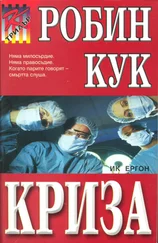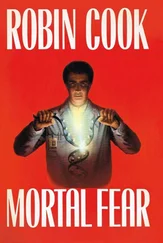“What kind of decision?” Martin said tiredly.
“You’re going to have to decide if you can live with this whole affair. I know it is a shock. I confess I was not going to tell you how we were making our breakthroughs. But since you learned enough to nearly be liquidated, you had to know. Listen, Martin. I am aware that the technique of experimenting on humans without their consent, especially when they must be sacrificed, is against any traditional concept of medical ethics. But I believe the results justify the methods. Seventeen young women have unknowingly sacrificed their lives. That is true. But it has been for the betterment of society and the future guarantee of the defense superiority of the United States. From the point of view of each subject, it is a great sacrifice. From the point of view of two hundred million Americans, it is a very small one. Think of how many young women willfully take their lives each year, or how many people kill themselves on the highways, and to what end? Here these seventeen women have added something to society, and they have been treated with compassion. They have been well cared for and have experienced no pain. On the contrary they have experienced pure pleasure.”
“I can’t accept this. Why didn’t you just let them kill me?” said Philips in a tired voice. “Then you wouldn’t have had to worry about my decision.”
“I like you, Philips. We’ve worked together for four years. You’re an intelligent man. Your contribution to the development of artificial intelligence was and can be enormous. The medical application, especially in the field of radiology, is the cover for this whole operation. We need you, Philips. It doesn’t mean we can’t do without you. None of us is indispensable, but we need you.”
“You don’t need me,” said Philips.
“I’m not going to argue with you. The fact is, we do need you. Let me emphasize one other point. No more human subjects are needed. In fact this biological aspect of the project is soon to be closed down. We have obtained the information we needed and now it’s time to refine the concepts electronically. The human experimentation is over.”
“How many researchers have been involved?” asked Philips.
“That,” said Michaels proudly, “is one of the beauties of the whole program. In relation to the magnitude of the protocol, the number of personnel has been very small. We have a team of physiologists, a team of computer people and several nurse practitioners.”
“No physicians?” asked Philips.
“No,” said Michaels with a smile. “Wait! That’s not entirely correct. One of the neuroscience physiologists is an M.D.-Ph.D.”
There was a silence for a few moments as the two men eyed each other.
“One other thing,” said Michaels. “You, obviously and deservedly, will take full credit for the medical advances that will be instantly realized with the application of this new computer technology.”
“Is that a bribe?” asked Philips.
“No. It’s a fact. But it will make you one of the most celebrated medical researchers in the United States. You will be able to program the entire field of Radiology so that the computers will be able to do all the diagnostic work with one-hundred percent efficiency. That will be an enormous benefit to mankind. You yourself told me once that radiologists, even good ones, only function around seventy-five percent. And one last thing...” Michaels looked down and shifted his feet as if he was somewhat embarrassed. “As I said, I can only control the agents to a degree. If they think someone is a security risk, it’s out of my hands. Unfortunately Denise Sanger is now involved. She doesn’t know the specifics about this research, but she knows enough to jeopardize the project. In other words, if you choose not to accept this program, not only you, but Denise too, will be liquidated. I have no control over that.”
At the mention of a threat against Denise, another emotion overwhelmed Philips’ sense of moral outrage. Hatred welled up inside of him. Only with great difficulty did he hold himself back from striking out in a fit of blind fury. He was exhausted and every nerve was drawn to its breaking point. It took every ounce of strength to force his mind back to rational thought. When he did, he was overcome by a feeling of futility in the face of the sheer power and momentum behind the project. Philips might have been able to sacrifice himself but he could not sacrifice Denise. A sad feeling of resignation settled over him like a smothering blanket.
Michaels put his hand on Philips’ shoulder. “Well, Martin? I think I’ve told you everything. What do you say?”
“I don’t think I have a choice,” said Martin slowly.
“Yes you do,” said Michaels. “But it’s a narrow one. Obviously both you and Denise will stay under close surveillance. You will be given no chance to give the story to either Congress or the press. There are contingency plans for any eventuality. Your choice is merely between life for you and Denise or purposeless instant death. I hate to be so blunt. If you decide the way I hope you will, Denise will only be told that our research has had Defense Department application that you did not know about and that you became a mistaken security risk. She will be sworn to secrecy and that will be the end of it. It will be your responsibility to keep her from knowing the biological origins.”
Philips took a deep breath, turning himself away from the row of glass cylinders. “Where is Denise?”
Michaels smiled. “Follow me.”
Retracing their steps back through the double vault-like doors and past the amphitheaters, the two men walked down the rubble strewn corridor, turning into the old medical-school administrative office.
“Martin!” shouted Denise. She jumped up from a folding chair and rushed between two agents. Throwing her arms around Philips she burst into tears. “What has been happening?” she sobbed.
Martin couldn’t speak. His pent-up emotions overflowed with joy at seeing Denise. She was alive and safe! How could he take responsibility for her death?
“The FBI tried to convince me you had become a dangerous traitor,” said Denise. “I didn’t believe it for an instant, but tell me it isn’t true. Tell me this is all a bad dream.”
Philips closed his eyes. When he opened them he found his voice. He spoke slowly, choosing his words with great care, because he knew Denise’s life was in his hands; they had him shackled for the moment, but he would find a way to break their hold someday, even if it took years. “Yes,” said Philips. “It’s all a bad dream. It’s all a terrible mistake. But it’s over now.”
Martin tilted Denise’s face up and kissed her mouth. She kissed him back, secure that her feeling about him had been correct, that as long as she trusted him she would be safe. For a moment he buried his face in her hair. If individual life was important, then so was hers. For him more than anyone.
“It’s over now,” she repeated.
Philips glanced at Michaels over Denise’s shoulder and the computer expert nodded approval. But Martin knew it could never be over...
THE NEW YORK TIMES
SCIENTIST SHOCKS SCIENTIFIC COMMUNITY; SEEKS POLITICAL ASYLUM IN SWEDEN
STOCKHOLM (AP)—
Dr. Martin Philips, the physician whose research has recently propelled him into international celebrity status, disappeared yesterday afternoon under mysterious circumstances in Sweden. Scheduled for a lecture at 1 P.M. at the famed Carolinska Institute, the neuroradiologist failed to appear in front of a packed audience. Along with the celebrated scientist, his wife of four months, Dr. Denise Sanger, also disappeared.
Initial speculation suggested the couple sought seclusion from the attention that has been showered on them since Dr. Philips began unveiling his series of startling medical discoveries and innovations six months ago. That idea was abandoned, however, when it was learned that the couple had had surprisingly massive Secret Service protection and that their disappearance definitely depended on Swedish authorities’ cooperation.
Читать дальше












